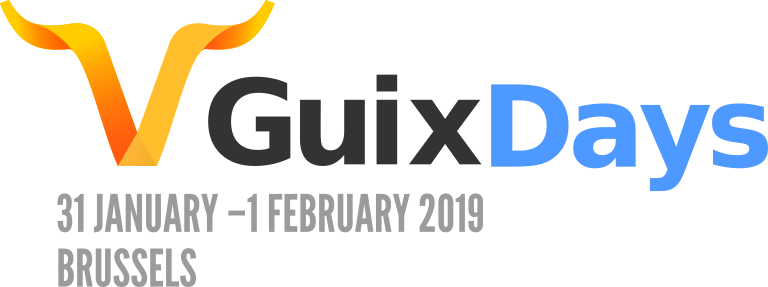Meet Guix at FOSDEM
As usual, GNU Guix will be present at FOSDEM in the coming days with a couple of talks:
- Saturday afternoon, Building a whole distro on top of a minimalistic language will present to the minimalist languages track audience how Scheme, rather than “piling feature on top of feature”, provides the fundamental tools that have allowed us to build a wide range of operating system features on top of it.
- In the same track, GNU Mes—Reduced binary seed bootstrap for Guix will report on two years of hard work tackling one of the most pressing security issues of operating systems—the “trusting trust” attack. Janneke will present exciting bootstrapping achievements and their integration in Guix.
- Ricardo will present the GNU Guix Workflow Language in the same track—on the benefits of having reproducible software deployment built into a scientific workflow execution engine.
- On Sunday afternoon (don’t rush to the train station yet!), GNU Guix’s take on a new approach to software distribution will present to fellow distro hackers how Guix differs from “traditional distros” and how it tries to make popular ad-hoc software deployment tools (pip, VirtualEnv, Cabal, but also Flatplak, Docker—you name it) less appealing than its integrated solutions.
The minimalist languages track will also feature talks about GNU Guile and about Racket that you should not miss under any circumstances!

For the second time, we are also organizing the Guix Days as a FOSDEM fringe event, a two-day Guix workshop where contributors and enthusiasts will meet. The workshop takes place on Thursday Jan. 31st and Friday Feb. 1st at the Institute of Cultural Affairs (ICAB) in Brussels.
This year there will be few talks; instead, the event will consist primarily of “unconference-style” sessions focused on specific hot topics about Guix, the Shepherd, continuous integration, and related tools and workflows. We are also happy to welcome fellow Nix hackers, which should allow us to develop cross-distro cooperation.
Attendance to the workshop is free and open to everyone, though you are invited to register (there are only a few seats left!). Check out the workshop’s wiki page for registration and practical info. Hope to see you in Brussels!
About GNU Guix
GNU Guix is a transactional package manager and an advanced distribution of the GNU system that respects user freedom. Guix can be used on top of any system running the kernel Linux, or it can be used as a standalone operating system distribution for i686, x86_64, ARMv7, and AArch64 machines.
In addition to standard package management features, Guix supports transactional upgrades and roll-backs, unprivileged package management, per-user profiles, and garbage collection. When used as a standalone GNU/Linux distribution, Guix offers a declarative, stateless approach to operating system configuration management. Guix is highly customizable and hackable through Guile programming interfaces and extensions to the Scheme language.
Sauf indication contraire, les billets de blog de ce site sont la propriété de leurs auteurs respectifs et publiés sous les termes de la licence CC-BY-SA 4.0 et ceux de la GNU Free Documentation License (version 1.3 ou supérieur, sans section invariante, sans texte de préface ni de postface).